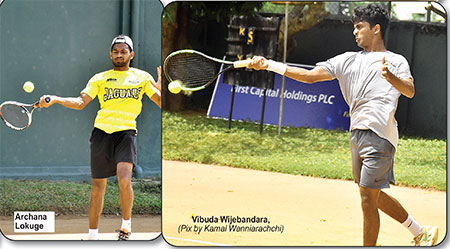Sports
Prasad’s eccentrics will be missed not his service
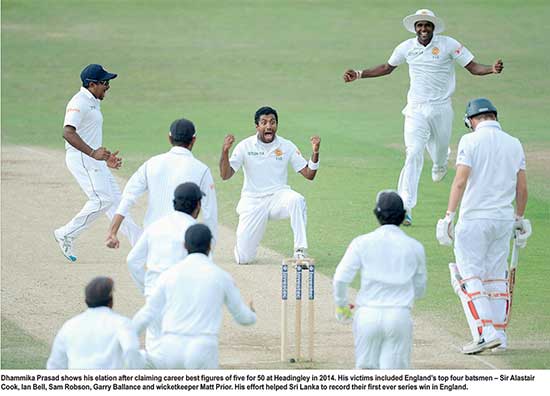
There is a bus stop in Nagoda, just before Kandana junction on Negombo road. It’s called ‘No ball Handiya’. Not because of Dilhara Fernando but as even Dhammika Prasad, who represented Sri Lanka in 25 Test matches, hails from the same vicinity. Both fast bowlers attended the same school – De Mazenod. They had a fine coach – Vernon Senanayake, even he couldn’t rectify their overstepping problems.
Prasad was quite a handful with the new ball as he could generate genuine pace. Once in Galle he dismissed Chris Gayle and celebrated it by lying down on the pitch with outstretched arms. The embarrassment was just around the corner. Umpire Richard Kettleborough approached him to inform that it was a no ball. Gayle would go onto score a career best 333 with 34 fours and nine monstrous sixes with most of them landing on the Galle bus halt!
Not sure whether any other Sri Lankan fast bowler has had an impressive debut as Dhammika Prasad. It was against India at P. Sara Oval. He took three wickets in the first innings. Guess the names? Sachin Tendulkar, Rahul Dravid and Virender Sehwag.
There was lot of bad blood during Sri Lanka’s tour of England in 2014. The England and Wales Cricket Board had reduced Sri Lanka’s Test matches to two and instead hosted India for five Tests. Sri Lanka’s Head Coach Paul Farbrace had defected to England ranks just two weeks prior to the tour. Then, there was the Mankading of Jos Buttler, ordered by of all people Marvan Atapattu, one of the nicest guys to play the game of cricket.
The first Test at Lord’s was a thrilling draw. Kumar Sangakkara playing his last Test at The Home of Cricket scored a hundred. Sri Lanka’s last pair saw off some tensed moments thanks to the DRS.
The tourists fought tooth and nail in the second Test at Headingley. After conceding a lead of over 100 runs in the first innings, they fared better in the second innings. Sri Lanka were 150 runs ahead with four wickets in hand and needed 100 or so more to set England a decent target. Captain Angelo Mathews was their biggest hope. When Dhammika Prasad joined him, the instructions were clear. Mathews was going to do the scoring, Prasad had to block. But our man had a brain fade. The first ball he faced, Prasad slashed Liam Plunkett and was caught at third man. Mathews was furious and threw his bat away.
As Prasad was nearing the dressing room, team manager late Michael De Zoysa told all his players and support staff to give the batsman, who had just collected a pair, the cold shoulder. Not a single person in the dressing room spoke to Prasad that afternoon.
This angered Prasad. What followed was an aggressive spell of fast bowling. Prasad finished with career best figures of five for 50. More importantly, Sri Lanka went onto win their first ever Test series in England.
By 2015, Prasad had emerged as Sri Lanka’s leading fast bowler. That year he finished as one of the top ten wicket takers in the world in Test match cricket. We weren’t short of Prasad’s eccentrics. He picked up a fight with India’s Ishant Sharma at SSC. Prasad peppered Ishant with a barrage of short pitched bowling and exchanged words. Team mate Dinesh Chandimal came to Prasad’s aid and even brushed shoulders with the lanky Indian fast bowler. All three were charged by the Match Referee Andy Pycroft.
Later that day, as Pycroft entered Taj Samudra he saw a sight that warmed his heart. Prasad and Ishant were having coffee at the lobby. The Match Referee treated Prasad with kid’s gloves but banned Chandimal for one match. Chandimal did not speak with Prasad for several weeks.
We never saw Prasad’s full potential. He was very unlucky with injuries; like ahead of the ICC Cricket World Cup in 2015. On the eve of the curtain-raiser in Christchurch, Prasad hurt his hand attempting a return catch and was sent home. He played little cricket from thereon.
Despite all eccentrics, Prasad’s team mates vouch that the bloke has a heart of gold. Successive Sri Lankan captains have valued his service for he makes their jobs so easy.
Most cricketers can be found in Colombo-7s posh clubs socializing with friends when they have day-offs. To trace Prasad you have to go to the local bar. He will either be found spending time with his villagers at Sensasia in Peralanda or CASA in Ragama. Once established, most players prefer to move to Colombo. Prasad has remained in his village – Ragama, not too far away from No Ball Junction.
Prasad feels the pain of his fellow Sri Lankans. As the country went into a lock-down following the outbreak of the pandemic last year, Prasad was busy collecting dry rations and distributing them among daily wage earners. Jesus fed 5000 people in Capernaum. Prasad fed 2000 families in Gampaha, week after week. He will announce his retirement from cricket today. He will be missed.
- News Advertiesment
See Kapruka’s top selling online shopping categories such as Toys, Grocery, Flowers, Birthday Cakes, Fruits, Chocolates, Clothing and Electronics. Also see Kapruka’s unique online services such as Money Remittence,News, Courier/Delivery, Food Delivery and over 700 top brands. Also get products from Amazon & Ebay via Kapruka Gloabal Shop into Sri Lanka.
Sports
Imran steals the show!

(This article by The Island’s respected cricket columnist Rohan Wijeyaratne first appeared in these pages 16 years ago; on the 11th of June 2005. As World Cup winning former captain and current Prime Minister of Pakistan Imran Khan has just visited the island, we reproduce this article in today’s edition)
In my youth – which is to say, quite a long time ago – I would often go to the YMCA canteen for a snack and a tea after whatever business that brought me to the Fort. Doing the same recently more for old times sake than anything else, I saw a familiar figure ahead of me heading in the same direction. Quickening my step and drawing abreast, I introduced myself to the gentleman concerned. He was none other than my old school English teacher, V. Thanabalasingham.
Not just a teacher, but an Institution
Those of you who may have passed through the portals of Ananda College during the 1960s and the early 70s and no doubt been well rounded in many ways, will admit to a man that when it came to the teaching of English, the name Thanabalasingham held no peer. In his prime, he was not just a brilliant teacher but an Institution. And volumes wouldn’t suffice to do him justice – such was the impact he made on all whom he touched, be it with the brilliance of Thackeray, Dickens, Chaucer or the Direct Method English Course that served as our bread and butter in English education at the time.
Another, from a different mould
Another teacher from an entirely different mould was Upali Ratnayake, now the Executive Director of CIMA. At the time he was introduced to us at the ‘A’ level stage, he appeared to our free spirits a cut above the rest. He acquired this status by doing exactly the opposite of what he was expected to do, which was to teach us English as a preparatory step towards an easier passage through University. Upali Ratnayake actually taught us nothing. Yet we learnt a good deal off him, discussing almost everything other than the subject he was paid for! His most endearing virtue was that he never spoke to us from a great height. And in that process, he taught us one of the most lasting lessons in life.
Several decades later, I nearly fell off my chair to receive a phone call from him inviting me to the BMICH on the 28th of May where Imran Khan and Kumar Sangakkara were due to speak at the CIMA Global Leaders Summit. The topics for discussion were “Passion for Perfection” and “Ordinary people in extraordinary acts.” The topics and the speakers seemed irresistible. And so I went.
What a speech!
I wasn’t disappointed. Neither were hundreds of others present. And predictably, Imran stole the show. Blessed with a presence that would have put any Grecian god to second class status, this tall, elegant and immensely handsome man spoke with such brilliance, clarity and articulation, the end result was as gripping as it was inspiring. In his wake, those who followed appeared cumbersome and dreary, almost like how Kenny Mackay would appear after the brilliance of a vintage Sobers or a Dexter! Kumar Sangakkara having to make do with less time than was his rightful share went largely unheard, tending to speak more to his fellow panelists than his audience. He will learn. As a probable hot contender to the top post after Atapattu, there will be many more occasions where he will be required to speak in public.
“Ambition must be upgraded, never downgraded”
Imran was of the view that all humans were endowed with limitless potential. Their limits if any, were often self imposed. Those who achieved extraordinary heights were those who dared to go beyond their self imposed limits. They thought big, dreamed big and did not allow their limitations to get in the way of achieving their dreams. He drew parallels from his own experiences in cricket, his cancer hospital project and his involvement in national politics to establish the point.
The four secrets
Starting with cricket, and drawing parallels with other legends including Zaheer Abbas, Imran stressed the need for a clear vision, the hunger to succeed, the willingness to sacrifice and self belief as being the four secrets to achieve one’s vision. Self belief was a factor which Abbas, despite all his God given gifts, had in very short supply. Imran, on the other hand, was full of it (sometimes foolishly!), because he never thought he ever could lose a game each time he stepped on to a cricket field. He gave many examples of it, including the victories against the might of the ‘invincible’ West Indians in 1986 against all odds. And that, despite having requested and got, ‘neutral’ umpires in a home series in Pakistan! He just wanted to make sure that when they won, there would be none to say that the umpires had anything to do with it!
Drawing from examples of his own life, Imran said that in all one’s life, one would hear others say why something cannot be done. That if accepted, would be the start of everyone’s downward spiral. Ambition he said, must be upgraded, never downgraded. And the more you pit your mind against the winds that resist you from reaching your ambition, the stronger your mind will become. Therefore, ambition must take precedence over everything. And towards achieving that, one should be willing to sacrifice anything. “Compromise” said Imran “for your vision, but never ever on your vision.” Great words!
Why the 3rd world is the 3rd world!
Relating what made him take to politics, Imran said that the problem with the third world was that the ruling elite would put itself above the law and deprive the ordinary folk of any justice. Hence his political movement was primarily meant to establish the rule of law in his country, where the weak and the strong were equal in the eyes of the law. “No society in the history of mankind has ever progressed without the rule of the law. The reason why the third world remained the third world was because it had very poor rule of the law. The elitist types did whatever they wished and got away with it, while the common man and the small and medium industrialist were all deprived of justice.” None could have spoken a truer word!
The ways of the mafia
Imran went on to say that when fighting for the rule of Law, one would be pitted against entrenched vested interests; the most powerful elite in the country. These were those who could buy justice. In Imran’s case, these were men who were also his good friends. Yet he preferred to take on the mantle of a social pariah instead, preferring to stand steadfast to his vision. The mafia usually reacts in such situations in either of two ways. They would either eliminate you or make you join the system. Just five months after his party was formed, he was offered 30 seats in Parliament out of 270. Imran refused, because he realized he had no chance of winning against entrenched political families that controlled his country. He knew the moment he joined them, he would need to compromise with his vision. So he refused, and got wiped out at the elections.
Refusing the Prime Ministership of Pakistan
When General Musharaff took over with Pakistan’s fourth military dictatorship in its brief history, he made all the right noises such as ridding the country of “sham” democracy and so on. No sooner Musharaff formed his own party, Imran was yet again invited, this time to become the Prime Minister of Pakistan. “But when I discovered that joining his coalition meant joining the biggest crooks in the country,” he had no difficulty in refusing. He was chided for his decision by many who argued that he could have joined and then fixed things up. But Imran said the decision was easy to make, as his vision was very clear. And it was one’s vision that decided when to compromise and when not to.
Imran’s vision
Imran’s vision was an independent and credible judicial system in Pakistan. So he asked himself the question, could General Musharaff afford an independent judiciary? The answer to him was obvious. If such a judicial system prevailed, most of the powerful men in his country would be tried for treason under article six of the country’s constitution. The sentence for treason was death. And he was therefore convinced that neither Musharaff, nor those around him could afford an independent and credible judicial system. And so, with his firm “No” Imran watched his party being destroyed yet again, to one seat, in parliament. This time it was by General Musharaff himself.
(To be continued tomorrow)
Sports
Spinners give India early advantage in third Test
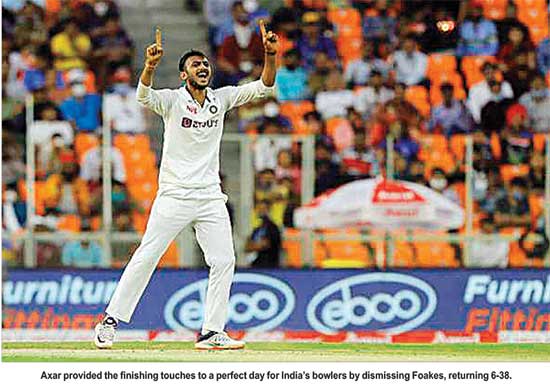
Indian spinners shot England out for just 112 inside two sessions with Ravichandran Ashwin and Axar Patel sharing the spoils after pacer Ishant Sharma opened the floodgates in his milestone 100th match on the opening day of the day-night third Test in Ahmedabad yesterday.
England were all out for 112 in 48.4 overs in the second session on a spin-friendly Motera pitch with Patel (21.4-6-38-6) grabbing his second five-for in his second Test while Ashwin (16-6-26-3) took three.
Openers Rohit Sharma (5) and Shubman Gill (0 ) negotiated five overs to take India to five for no loss at the dinner break.
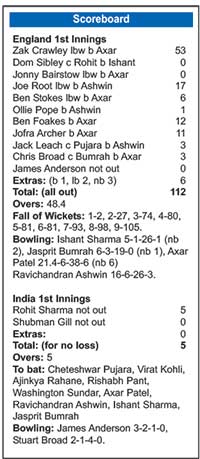 Gill, however, survived after TV umpire ruled him not out in the third over after England claimed for a catch.
Gill, however, survived after TV umpire ruled him not out in the third over after England claimed for a catch.
Ishant, only the second Indian fast bowler after Kapil Dev to play in 100 Tests, fittingly took India’s first wicket in the third over as he dismissed opener Dominic Sibley for nought.
Thereafter, it was all an Ashwin and Patel show as the duo bamboozled the England batsmen to complete the submission, except for the other opener Zak Crawley, who hit an eminently delectable half-century. Six English wickets fell in the second session.
England did not have any substantial partnership with the 47-run stand for the third wicket being the highest. They lost their last seven wickets for just 38 runs.
Crawley’s brilliance was, however, neutralised by the Indian spinners as England were left reeling at 81 for four going into tea after an exciting opening session in the pink ball Test.
Two wickets fell in as many overs after the resumption of the second session, with Ashwin and Patel taking one each, to reduce England to 81 for 6.
Ashwin sent Ollie Pope’s (1) off-stump cart-wheeling with a beauty of a delivery, bowling round the wicket, before Patel trapped Ben Stokes (6) LBW in the next over with a ball that spun in.
Jofra Archer (11) did a tad better as he hit a four in the second ball he faced and another boundary off Ashwin. But, Patel had him soon, cleaning up his off-stump to send England innings into a mess.
England’s rapid slide continued with Jack Leach edging one to the gully where Cheteshwar Pujara took a low catch off Ashwin, though the TV umpire took time to confirm the decision.
Crawley’s effort was the only silver lining for England. Having missed the first two Tests due to a freak wrist injury, the stylish right-hander’s driving was elegance personified as he hit ten boundaries during his 84-ball 53.
Sports
Top players secure third round places
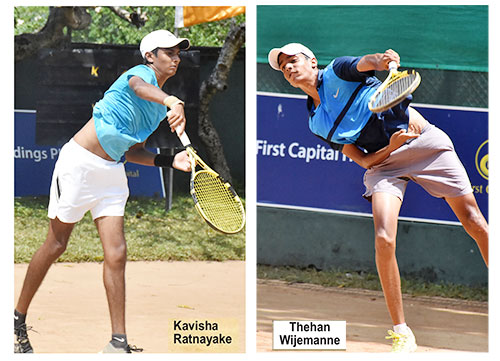
SSC Open Ranking Tennis
Thehan Wijemanne, Kavisha Ratnayake, Vibuda Wijebandara, Savith Weerasinghe, Kiran Viravanathan, Archana Lokuge advanced to the men’s singles third round at the SSC Open Ranking tennis tournament on Tuesday.
Some of the leading players fighting to improve on their impressive performances produced at the Tennis Nationals and the Colombo Championships during recent weeks knocked out their opponents easily to secure third round places.
